America’s First Female Playwright and Historian
Image: Young Mercy Otis Warren
Mercy Otis Warren was an American writer and playwright, known as the Conscience of the American Revolution. Her proximity to political leaders and events of her day, gives particular value to her writing on the American Revolutionary period. With a life that spanned three wars and the deaths of three sons and a husband, Warren remained undeterred in her pursuit of the intellectual life.
Mercy Otis was born on September 25, 1728 in Barnstable, Massachusetts – on Cape Cod. Naturally political, she involved herself from girlhood in the conversations of the men in her family. Her father encouraged her to excel, which in colonial America meant she was tutored with her Harvard-bound brother James. But for Mercy a college education was impossible.
That Mercy waited to wed until age twenty-six showed something of her independent nature. In 1754, she married James Warren, a farmer and politically-active merchant from Plymouth, Massachusetts, a college friend of her brother. Her literary inclinations were fostered by both these two men, and she began early to write poems and essays.
Mercy moved a few miles north to Plymouth when she married, and never ventured beyond eastern Massachusetts, but the life of her mind was so rich that she was respected by the most cosmopolitan and politically important men of her era.
Her husband, James Warren, apparently understood the “inner” Mercy from the start for he filled their Plymouth home with books and encouraged her to read and write, especially the latter. During the tense pre-Revolutionary years, in between birthing and raising five sons, Mercy began by writing poetry.
Around 1765, Mercy started to write patriotic poetry, which she meant only as amusement to share with her friends. She published Massachusetts Song of Liberty, and it soon became the most popular song of the colonies.
As a member of the Massachusetts House of Representatives and its speaker, a member and president of the Provincial Congress, and paymaster-general, James Warren took a leading part in the events of the American revolutionary period, and his wife followed its progress with keen interest.
When her brother James became a leader in the revolutionary movement, the Warren home became a common meeting place for revolutionaries. Mercy became a counselor and advisor to him and his friends, Samuel Adams and John Hancock. Mercy, a highly intelligent woman, was dedicated to the American cause, yet her gender kept her from getting involved in politics. Instead she made her statements in her writing.
By the time Mercy started writing plays satirizing the Tories, brother had suffered physical and mental wounds because of his activism that left him a shadow of the man he’d been before he became, as Mercy later called him, “the first champion of American freedom.” Later, she would watch her sons and husband suffer career setbacks in part because of their uncompromising stands on the issues during and after the war.
When the colonies increasingly rebelled against English rule, Mercy Otis Warren became perhaps the most important of Revolutionary War women. Like the men of her family, she was among those ready to throw out the colonial governor.
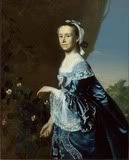
Image: Middle-Aged Mercy
In 1772, Mercy anonymously published anonymously The Adulateur, a blank-verse satire in which she criticizes the administration of Thomas Hutchinson, who was royal governor of Massachusetts in 1771-1774. She cast him as Rapatio, a villain intent on raping the colony. Rapatio appeared again in her second play, The Defeat (1773). She published her third, The Group in 1775, just as the rebellion began to be violent. All were thinly disguised attacks on specific public officials, and urged the taking of risks to achieve American independence.
An important experience in her life was meeting John Adams. In 1772 he, James Warren, and Samuel Adams gathered at the Warren home in Plymouth to discuss the formation of the committees of correspondence, radical Whig organizations created to guard against intrusions of Tory policy into the lives of citizens. From 1772 until her death, Mercy Warren maintained a correspondence with John Adams and his wife, Abigail Adams.
At a time when even most Americans still thought of democracy as an impossible notion, Mercy Otis Warren understood that the natural rights philosophy inherent in the Declaration of Independence would inevitably mean democracy and equality.
As she witnessed the outbreak of violence in 1775 in Massachusetts and the subsequent hardships the British occupation caused its residents, Mercy’s womanly side grew increasingly protective. By then, Mercy had already begun to speak out in a series of popular, widely published anti-British and anti-Tory propaganda plays. To protect her both from British persecution and colonial mockery as a woman writer, her identity was kept secret.
Mercy’s primary concern in 1775-1776, as she often wrote to her husband James, then President of the Provincial Congress, was his safety and that of her sons. Nevertheless, a future where her family and fellow citizens’ rights would be compromised was equally unthinkable. Self-sacrifice was imperative if the patriots were to triumph over oppression.
The Revolution had hardly begun when Mercy Warren began recording its history. During the next 30 years, through family tragedies, she used her connections to gather original material and publish one of the most interesting early histories of the Revolution, History of the Rise, Progress, and Termination of the American Revolution. The three volumes were finally published in 1805, when she was seventy-seven years old.
Her work not only provided an insider’s view of the Revolution, but also set an important precedent for women authors. Until that time, the few women writers who existed in America didn’t intend for their work to be published, but wrote primarily for themselves, family, and friends.
By the late 1780s, Mercy’s messages in print became a reality for, by then, the young republic was mired in an economic depression. Nor did the first draft of the U.S. Constitution in late 1787 relieve Mercy’s anxieties. She published anonymously an influential essay in May 1788 entitled Observations on the New Constitution, arguing for the necessity of a list of rights to protect the ordinary man.
Among the key rights Mercy advocated were freedom of speech, freedom of the press, trial by jury in civil cases, and restrictions on the power of the executive branch of government by the judicial and legislative bodies — points which, eighteen months later, became part of the Bill of Rights.
Mercy Warren thus became the first to publish books that marked her as a professional writer of nonfiction who – despite her upper class status – offered her work for sale. In 1790, she published under her own name all her poetic plays in one book, which she dedicated to George Washington.
She was bitterly resentful in her old age because of the restrictions imposed upon women, and focused particularly on educational reform. She chafed at the memory of doing needlework while her brothers were taught Latin and Greek, and she argued that such artificial limits on achievement harmed both men and women.
Though it may have appeared that few understood Mercy’s message at the time, the first serious educational institution for women, Emma Willard‘s Troy Female Seminary, appeared less than a decade after her death. Warren’s thoughts on the subject may have had more influence than she realized.
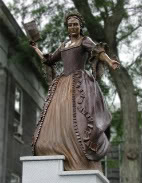
Image: Mercy Otis Warren Monument
At the Barnstable County Courthouse, a statue of Mercy Otis Warren stands with one arm raised holding up the Bill of Rights to which she was an unsung contributor. The statue is a powerful reminder of a Founding Mother’s warning about the human tendency to abuse power, but also the potential we have as individuals to make our voices heard.
Mercy Otis Warren died October 19, 1814, in Plymouth.
SOURCES
The Muse of the Revolution
Wikipedia: Mercy Otis Warren
Remembering a Founding Mother
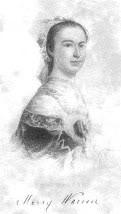
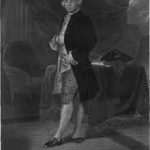


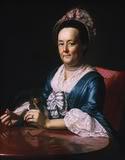


I just found this site while doing research on family history. I have several ancestors among the revolutionary era Livingstons. I think this a great blog and will try to spread word of it.